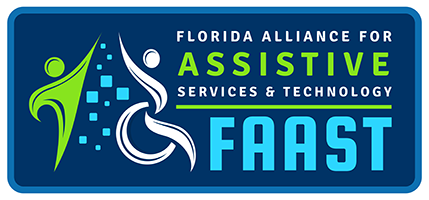How to Get a Proper Assistive Technology Assessment
Who Does AT Assessments?
Assistive Technology (AT) assessments are usually received from rehabilitation providers who are employed in places such as Hospitals, Doctor’s Offices, universities, schools, or by non-profit organizations. Providers who perform assessments are usually in some sort of therapy or rehab field. There is no requirement for them to have an AT Certification, but it is very helpful for them to be familiar with the wide range of AT available.
The Rehabilitation Engineering and Assistive Technology Society of North America, commonly called RESNA, offers a national level certification for three specialties. The candidates for certification typically must meet specific requirements to be eligible, and those that are eligible must pass an examination to assess their abilities. The three certifications that RESNA specializes in are:
- Assistive Technology Professional (ATP): The ATP is trained and specializes in identifying the needs of a person with disabilities, can assist in choosing the appropriate AT for the individual, and offer training in the AT.
- Seating and Mobility Specialist (SMS): This is an ATP that specializes in an Individuals mobility needs such as seating, positioning, and moving around.
- Rehabilitation Engineering Technologist (RET): This is one of the more defined ATP roles. The RET specializes in adapting, engineering, and fabricating specialty AT for an individual’s unique needs.
Having a qualified person who specializes in Assistive Technology is extremely important in the assessment process. Also, Having someone who is able to provide the necessary training for the equipment is equally important. We can also provide that training.
Some types of AT professionals who provide ara-specific assessments include (but are not limited to):
- Occupational Therapist (OT): Can evaluate hand (fine motor) and total body (gross motor) skills, your abilities with touch and movement, perception, positioning abilities, and will also help to find the person’s best method of using assistive technology.
- Physical Therapist (PT): Evaluates seating, positioning, and mobility. The PT can work closely with the OT and Speech-Language Pathologist (SLP) to find the best position for the person to be in when using the technology.
- Speech-Language Pathologist (SLP): Evaluates the person’s communication abilities. The SLP is very important in deciding the type of augmentative communication that will work.
- Rehabilitation Engineers: Design and make customized technology.
- Architects: Plan any structural changes needed in buildings.
- Physicians: Write prescriptions for an assistive technology assessment and for recommended equipment.
- Aging in Place Specialists: Can help evaluate your home for safety and ease of use
- Audiologists: Assess and recommend hearing and listening aids.
Can Vendors Provide Assessments?
Vendors sell assistive technology devices and services, have extensive knowledge of their products, and can be very valuable in the process of finding the correct device for you. However, they do have a conflict of interest in the assessment process because they are in business to sell their devices and services. It can be difficult to know if a vendor is trying to meet your needs, or theirs. It may also be easy to get caught up in specialized features you do not need. Some vendors make great recommendations based on customer needs, but not always.
You can always reach out to us for recommendations and information. Contact us here
What Should my Assessment Include?
A proper assistive technology assessment will inform the funding source about how the person can benefit from the assistive technology, including:
- A detailed description of the individual’s disability and how it relates to the assessment, including any relevant background information.
- Identifying any aspects that need to be considered if the assessment did not occur in the setting where the AT will typically be used.
- The specific classification and type of assistive technology that is being recommended.
- Specific information on how and why the assistive technology will meet their needs.
- How the professional reached their decision. Such as a physical assessment, Device demonstrations performed, available funding, etc.).
- Where the individual can obtain the recommended assistive technology.
- Multiple funding options for the equipment.
- Information regarding warranty, service agreements, and other maintenance information and recommendations for the assistive technology.
- The potential estimated cost of maintenance and repairs for the device.
- Description of how repairs and maintenance will be done. (Local vendor, shipping, in the home, etc)
- The availability of equipment for loan while waiting for funding, repair, or replacement. (Our Loan program can help with that.)
- Identifying any training needs for the recommended AT, who is able to provide that training (i.e. the vendor, manufacturer, or an outside provider such as FAAST), including any training related expenses.
1/22/2019 Edit: For an Accessible list of those who have ATP, SMS, or RET credentials, RESNA maintains a list available on their website https://www.resna.org/ by searching using the box provided at the top right of their home page.


